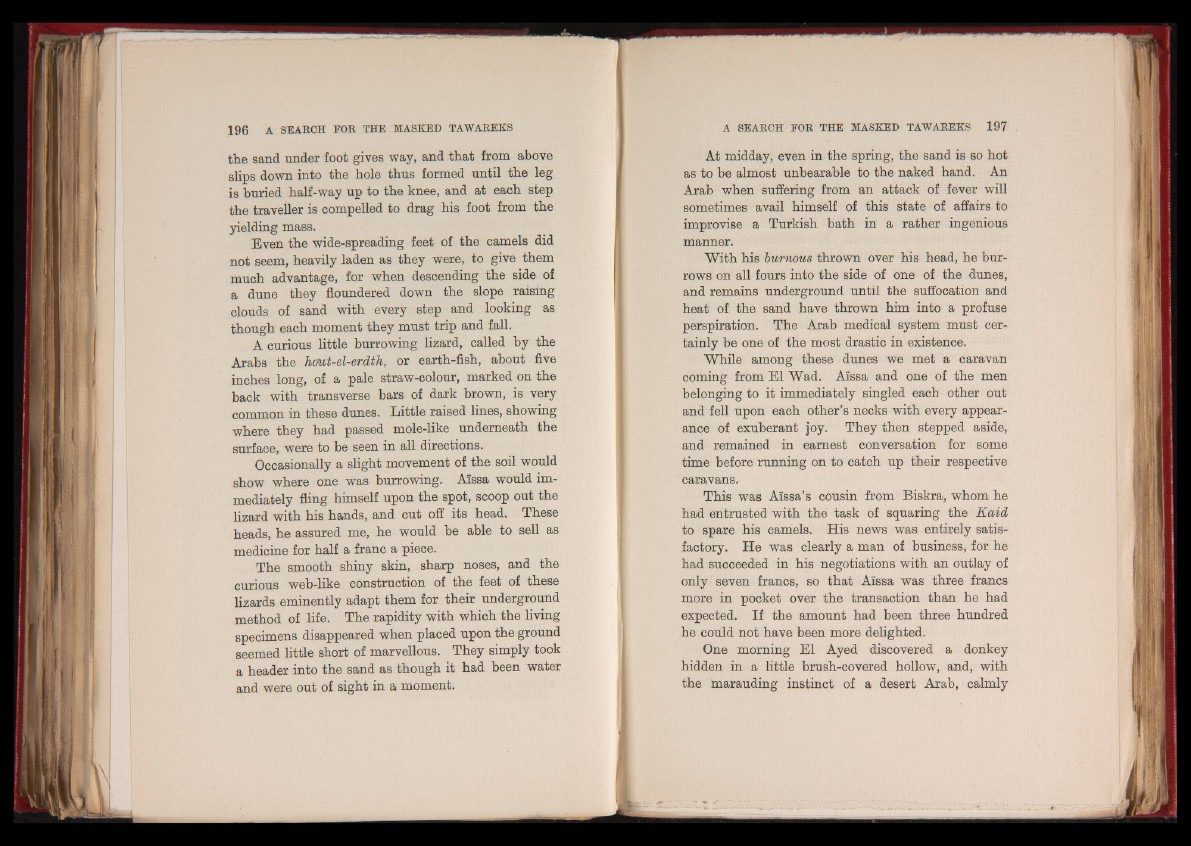
the sand under foot gives way, and that from above
slips down into the hole thus formed until the leg
is buried half-way up to the knee, and at each step
the traveller is compelled to drag his foot from the
yielding mass.
Even the wide-spreading feet of the camels did
not seem, heavily laden as they were, to give them
much advantage, for when descending the side of
a dune they floundered down the slope raising
clouds of sand with every step and looking as
though each moment they must trip and fall.
A curious little burrowing lizard, called by the
Arabs the hout-el-erdth, or earth-fish, about five
inches long, of a pale straw-colour, marked on the
back with transverse bars of dark brown, is very
common in these dunes. Little raised lines, showing
where they had passed mole-like underneath the
surface, were to be seen in all directions.
Occasionally a slight movement of the soil would
show where one was burrowing. Aissa would immediately
fling himself upon the spot, scoop out the
lizard with his hands, and cut off its head. These
heads, he assured me, he would be able to sell as
medicine for half a franc a piece.
The smooth shiny skin, sharp noses, and the
curious web-like construction of the feet of these
lizards eminently adapt them for their underground
method of life. The rapidity with which the living
specimens disappeared when placed upon the ground
seemed little short of marvellous. They simply took
a header into the sand as though it had been water
and were out of sight in a moment.
At midday, even in the spring, the sand is so hot
as to be almost unbearable to the naked hand. An
Arab when suffering from an attack of fever will
sometimes avail himself of this state of affairs to
improvise a Turkish bath in a rather ingenious
manner.
With his burnous thrown over his head, he burrows
on all fours into the side of one of the dunes,
and remains underground until the suffocation and
heat of the sand have thrown him into a profuse
perspiration. The Arab medical system must certainly
be one of the most drastic in existence.
While among these dunes we met a caravan
coming from El Wad. A'issa and one of the men
belonging to it immediately singled each other out
and fell upon each other’s necks with every appearance
of exuberant joy. They then stepped aside,
and remained in earnest conversation for some
time before running on to catch up their respective
caravans.
This was Aissa’s cousin from Biskra, whom he
had entrusted with the task of squaring the Raid
to spare his camels. His news was entirely satisfactory.
He was clearly a man of business, for he
had succeeded in his negotiations with an outlay of
only seven francs, so that A'issa was three francs
more in pocket over the transaction than he had
expected. If the amount had been three hundred
he could not have been more delighted.
One morning El Ayed discovered a donkey
hidden in a little brush-covered hollow, and, with
the marauding instinct of a desert Arab, calmly